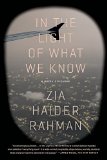Summary | Excerpt | Reviews | Beyond the Book | Readalikes | Genres & Themes | Author Bio

When we left, Zafar suggested that we walk back to college, rather than take a bus, and I agreed, assuming that he wanted to discuss something. The mathematician Kurt Gödel used to walk, setting off at sunset and returning after midnight, and found that his best ideas came to him in this stretch of time. Albert Einstein, who was deeply fond of Gödel, and who was also at the Institute for Advanced Study in Princeton, used to say in his later years, when he no longer engaged in much research, that he went to the institute daily only for the privilege of walking home with Kurt.
I thought Zafar wanted to talk, but in fact he was silent all the way down the Banbury Road. I sensed that he was searching not so much for a form of words but for clarity of thought. I recalled the map to which my friend was obviously drawn, and though I wanted to ask him what it was that had held his attention, I was reluctant to break the contemplative silence. On reaching Broad Street, as we approached the college gates, he spoke. You must meet my parents, he said, and that is where he left it.
More than a year passed before I did. On the day Zafar finished his final exams, in two years rather than three, when my own were still one year off, he informed me that his parents were to arrive at seven thirty the following morning. He asked me to meet him at the college's north entrance, to help him load his things, after which I was most welcome, he said, to come with them to a café in Headington for some breakfast, before the three of them, he and his parents, set off on the journey back to London.
At seven thirty on Saturday, Oxford was, and I expect it still is on every Saturday morning, perfectly quiet. It was odd that his parents should arrive so early; after all, the trip from London would have taken only an hour or thereabouts. The only explanation I could imagine was that Zafar was ashamed of his parents and did not want others to meet them, and that it was for this reason he had arranged to be collected at such an hour.
I found Zafar and his father already loading bags and boxes into a Datsun Sunny. His father had a beard and was wearing a skullcap. Standing in gray trousers, Hush Puppies, and a green V-neck sweater, he greeted me with a smile, tilting his head in what seemed a rather deferential way. Asalaam-u-alaikum, he said, before breaking into Urdu, a language that I know Bangladeshis of a certain age could speak but that is today, in the main, the language of Pakistanis. I supposed that Zafar had mentioned to him that my family was Pakistani originally. When I responded that my Urdu was very poor, Zafar's father looked disappointed, but then he took my hand into both of his and, rather unconfidently, repeated hello a few times.
Zafar's mother, standing by the car in an indigo sari that was pulled over her head, also greeted me with Asalaam-u-alaikum, but she bore herself with a self-assurance I did not see in his father. Pointing to the sandstone buildings around us, some of which had stood there for several hundreds of years, she commented on how old everything in Oxford looked. Can't they afford anything new? she asked earnestly. I looked at Zafar, who I am quite sure had heard this, but his eyes avoided mine. I understood then that in the two years he had spent at Oxford, a town less than sixty miles from London, this was the first time they had visited him, and this only as he was leaving the place stealthily one morning.
His parents' pronunciation of Asalaam-u-alaikum seemed rather affected, although I was able to recognize it as the one adopted by certain pious Muslims, particularly by many of those who have undertaken the pilgrimage, the tour of duty, to the holy city of Mecca. There, amid the throng of thousands of Muslims from across the world, this greeting presumably acquires a special significance as mediator in a Babel of languages, the Nigerian greeting the Malaysian and the Bangladeshi greeting the Uzbek. Perhaps an Arab pronunciation of the phrase proclaims the spirit of brotherhood. Standing there, as he and his father finished loading the last of the boxes, I wondered if it was his parents' religiosity of which Zafar was ashamed, though I understand now, having learned something of Zafar's own religious turn, that this was unlikely. I believe that while he was ashamed of his parents, he was more ashamed of being ashamed.
Excerpted from In the Light of What We Know by Zia Haider Rahman. Copyright © 2014 by Zia Haider Rahman. Excerpted by permission of Farrar, Straus & Giroux. All rights reserved. No part of this excerpt may be reproduced or reprinted without permission in writing from the publisher.
Any activity becomes creative when the doer cares about doing it right, or better.
Click Here to find out who said this, as well as discovering other famous literary quotes!
Your guide toexceptional books
BookBrowse seeks out and recommends the best in contemporary fiction and nonfiction—books that not only engage and entertain but also deepen our understanding of ourselves and the world around us.